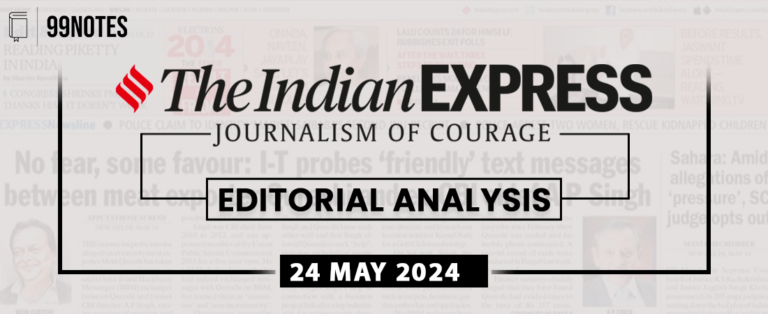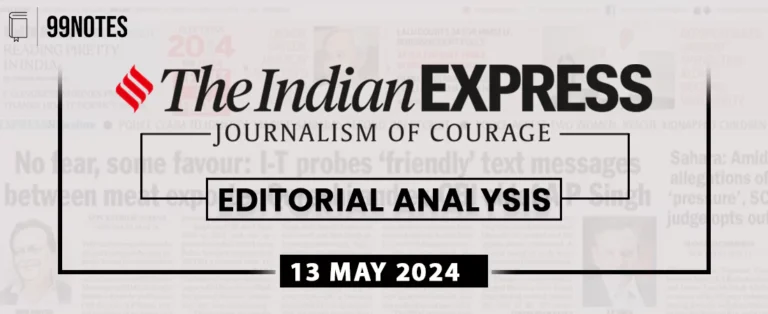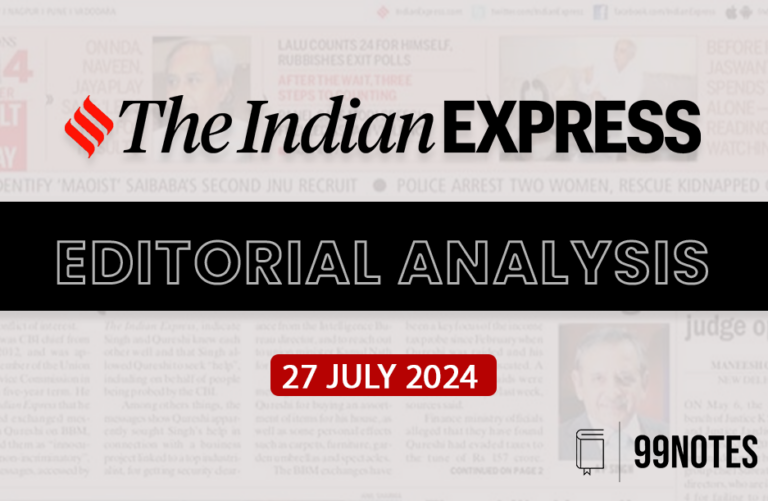16 Nov 2023 : Indian Express
Indian Express
16-November-2023
1) Ease of control
Context:
- The Cable Television Networks (Regulation) Act of 1995 is to be repealed, according to the draft Broadcasting Services (Regulation) Bill, 2023, published by the Ministry of Information and Broadcasting (MIB).
- The new measure seeks to harmonize DTH, IPTV, digital media, broadcasting, and over-the-top (OTT) regulations.
- This action is in line with the Prime Minister’s goals of “ease of doing business” and “ease of living” and comes after the IT Rules 2021 were introduced.
Concerns about Regulatory Intentions:
- The underlying goals of the Broadcasting Services Bill are doubtful, given the contentious character of the IT Rules 2021 and worries about possible government overreach.
- Regulations are necessary for the wellbeing of citizens, but the BJP’s experience with media regulation points to a possible emphasis on control over public service.
Potential Impact on Minority Representation:
- Opponents argue that the proposed Broadcasting Services Bill could be a factor in the marginalization or biased portrayal of minority Indian populations.
- The draft’s ambiguous language raises worries about the normalizing of a universal Hindu identity and the possibility of inciting animosity or discrimination against certain racial, religious, or linguistic communities.
Historical Context: Cable Television Networks (Regulation) Act, 1995:
- The original purpose of the Cable Television Networks (Regulation) Act, 1995 was to control advertising material and programming in response to the problems caused by unlicensed cable television networks.
- On the other hand, crtics argue that rather than actual public service, the government’s emphasis on content regulation has historically been motivated by intermittent worries about cultural invasion.
Challenges and Failures of Previous Regulations:
- Achieving transparency and reducing the number of illicit cable businesses was a challenge for earlier rules, such as the 1995 Act and its revisions.
- The interconnection of broadcasters, politicians, businesspeople, and cable providers frequently resulted in unethical behavior and conflicts of interest. 2003 amendments attempted to increase openness but left the fundamental problems unaddressed.
Lack of Regulation on Conflicts of Interest:
- Conflicts of interest in the Indian media industry have not been sufficiently addressed by the government’s regulatory initiatives.
- It appears that this issue is not addressed in the draft Broadcasting Services Bill, which raises questions about how well it would provide accountability and openness.
Oligopolistic Media Ownership Tendencies:
- Critics argue that the government’s regulatory actions can unintentionally encourage media ownership trends toward oligopoly.
- Concerns regarding “cultural invasion” and “anti-national” programming are weighed against the possible effects on Indian residents’ welfare.
- The proposed bill seems to combine authority over digital infrastructure with the right of citizens to choose what they watch.
Need for Regulation on Conflicts of Interest:
- Regulations addressing conflicts of interest within the media sector are clearly needed, especially in light of the ongoing discussions about cultural invasion and national welfare.
- Some who oppose regulations that support “ease of business” contend that in order to guarantee just practices and true public service, “ease of control and regulation” should also come first.
2) The cost of ambivalence
Context:
- The article starts off by pointing out how Indian society has a mixed relationship with alcohol, which was made particularly clear by the record-breaking sales of alcohol around Diwali.
- It implies that while promoting safer alcohol consumption, ethical public policy should respect individual choices.
Medical Perspective on Alcohol:
- The phrase “alcohol use or abuse” is examined, revealing that while society accepts moderate alcohol use, excessive intake is considered abuse.
- In contrast to the societal perspective on alcohol abuse when externalities negatively affect others, the article highlights the historical medical opinion that moderate alcohol usage is good.
Gender and Social Dynamics:
- Women are frequently the ones who suffer the most from men’s alcohol consumption, as the conversation goes into gender relations.
- Female leaders of anti-alcohol social protests are not uncommon.
- The article draws attention to the paradoxes in society where the wealthy are expected to behave properly yet the impoverished are permitted to drink alcohol.
Cultural and Religious Perspectives:
- Cultural and religious perspectives are used to analyze alcohol usage; the article points out that differing religious perspectives influence people’s views toward alcohol.
- The article highlights how contradictory society standards may be, with certain groups openly supporting alcohol consumption while others stigmatize it.
Changing WHO Policies:
- It is addressed how the World Health Organization’s position on alcohol has changed over time, going from “some alcohol is good” to “no alcohol is good.”
- The article highlights the advocacy and public health groups’ pressure that resulted in this modification.
- In keeping with the Constitution’s Directive Principles of State Policy, it also highlights India’s commitment to lowering alcohol consumption.
Political and Bureaucratic Approaches:
- The article attacks the present political strategy, citing states like Kerala and Haryana where laxer alcohol laws are implemented because income generation outweighs health concerns.
- It draws attention to official “dry days” and other bureaucratic practices as well as the lack of consideration for health in policymaking.
Need for Public Health Approach:
- The need for a public health strategy to reduce alcohol consumption is highlighted, with comparisons to tobacco control initiatives.
- Raising taxes, banning marketing, restricting access, and increasing awareness are all suggested in the article.
- There is talk about insufficient enforcement of current laws and violations such as surrogate advertising.
Way Forward:
- The article’s conclusion exposes the hypocrisy of society toward alcohol and advocates for frank, nonjudgmental dialogue.
- It calls into question the artificial division between modernity and traditionalism and promotes discussion of the trade-offs between generating income and minimizing negative health effects.
- It is emphasized that a rational national alcohol policy is required.
For Enquiry

16 Nov 2023 : Indian Express

16 Nov 2023 : PIB

16 November 2023 : Daily Current Affairs

16 November 2023 : The Hindu Editorial Notes PDF

15 Nov 2023 : Daily Quiz

15 Nov 2023 : Daily Answer Writing

15 Nov 2023 : Indian Express

15 Nov 2023 : PIB

15 November 2023 : Daily Current Affairs

15 November 2023 : The Hindu Editorial Notes PDF
Indian Express 16 Nov 2023 : Indian Express Indian Express
15-November-2023
1) Arms and the Man and AI
Context:
Both the military and the civilian…
November 2023 PIB 16 Nov 2023 : PIB PRESS INFORMATION BUREAU
16-November -2023
1. More than 200 unique Geographical Indications (GIs) products…
Daily Current Affairs 16 November 2023 : Daily Current Affairs Daily Current Affairs
16-November-2023
1. Modi launches mission for most backward of the Scheduled…
November 2023 The Hindu 16 November 2023 : The Hindu Editorial Notes PDF The Hindu Editorial
16-November-2023
1. The Nobel in economics as a need to course correct.
Topic:…
Daily Quiz 15 Nov 2023 : Daily Quiz 15 Nov 2023 : Daily Quiz…
mains answer writing 15 Nov 2023 : Daily Answer Writing Mains Answer Writing
15-November-2023
1. The Indian Constitution’s concept of the separation of…
Indian Express 15 Nov 2023 : Indian Express Indian Express
15-November-2023
1) Arms and the Man and AI
Context:
Both the military and the civilian…
November 2023 PIB 15 Nov 2023 : PIB PRESS INFORMATION BUREAU
15-November -2023
1. THE INDO-PACIFIC REGIONAL DIALOGUE 2023 (IPRD-2023)
Topic:…
Daily Current Affairs 15 November 2023 : Daily Current Affairs Daily Current Affairs
15-November-2023
1. Wholesale prices remain in deflation zone in Oct.
Topic:…
November 2023 The Hindu 15 November 2023 : The Hindu Editorial Notes PDF The Hindu Editorial
15-November-2023
1. A Norwegian perspective of India’s digital journey.
Topic:…



